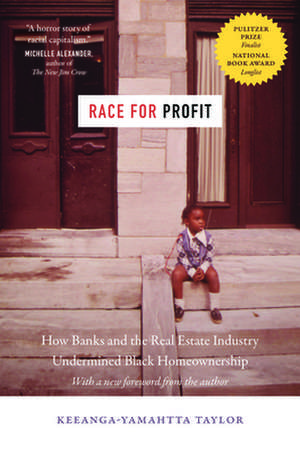Race for Profit: Justice, Power and Politics
Autor Keeanga-Yamahtta Tayloren Limba Engleză Paperback – 31 mar 2021
FINALIST, 2020 PULITZER PRIZE IN HISTORY
By the late 1960s and early 1970s, reeling from a wave of urban uprisings, politicians finally worked to end the practice of redlining. Reasoning that the turbulence could be calmed by turning Black city-dwellers into homeowners, they passed the Housing and Urban Development Act of 1968, and set about establishing policies to induce mortgage lenders and the real estate industry to treat Black homebuyers equally. The disaster that ensued revealed that racist exclusion had not been eradicated, but rather transmuted into a new phenomenon of predatory inclusion.
Race for Profit uncovers how exploitative real estate practices continued well after housing discrimination was banned. The same racist structures and individuals remained intact after redlining's end, and close relationships between regulators and the industry created incentives to ignore improprieties. Meanwhile, new policies meant to encourage low-income homeownership created new methods to exploit Black homeowners. The federal government guaranteed urban mortgages in an attempt to overcome resistance to lending to Black buyers - as if unprofitability, rather than racism, was the cause of housing segregation. Bankers, investors, and real estate agents took advantage of the perverse incentives, targeting the Black women most likely to fail to keep up their home payments and slip into foreclosure, multiplying their profits. As a result, by the end of the 1970s, the nation's first programs to encourage Black homeownership ended with tens of thousands of foreclosures in Black communities across the country. The push to uplift Black homeownership had descended into a goldmine for realtors and mortgage lenders, and a ready-made cudgel for the champions of deregulation to wield against government intervention of any kind.
Narrating the story of a sea-change in housing policy and its dire impact on African Americans, Race for Profit reveals how the urban core was transformed into a new frontier of cynical extraction.
| Toate formatele și edițiile | Preț | Express |
|---|---|---|
| Paperback (1) | 165.35 lei 3-5 săpt. | +22.33 lei 5-11 zile |
| Editorial A Contracorriente – 31 mar 2021 | 165.35 lei 3-5 săpt. | +22.33 lei 5-11 zile |
| Hardback (1) | 196.83 lei 3-5 săpt. | |
| University of North Carolina Press – 21 oct 2019 | 196.83 lei 3-5 săpt. |
Din seria Justice, Power and Politics
-
 Preț: 247.39 lei
Preț: 247.39 lei -
 Preț: 184.58 lei
Preț: 184.58 lei -
 Preț: 185.17 lei
Preț: 185.17 lei -
 Preț: 187.62 lei
Preț: 187.62 lei -
 Preț: 226.25 lei
Preț: 226.25 lei -
 Preț: 208.53 lei
Preț: 208.53 lei -
 Preț: 202.93 lei
Preț: 202.93 lei -
 Preț: 286.47 lei
Preț: 286.47 lei -
 Preț: 199.22 lei
Preț: 199.22 lei -
 Preț: 264.44 lei
Preț: 264.44 lei - 23%
 Preț: 658.53 lei
Preț: 658.53 lei -
 Preț: 214.85 lei
Preț: 214.85 lei -
 Preț: 249.43 lei
Preț: 249.43 lei -
 Preț: 259.14 lei
Preț: 259.14 lei -
 Preț: 219.73 lei
Preț: 219.73 lei -
 Preț: 251.54 lei
Preț: 251.54 lei -
 Preț: 287.46 lei
Preț: 287.46 lei -
 Preț: 251.36 lei
Preț: 251.36 lei -
 Preț: 291.87 lei
Preț: 291.87 lei -
 Preț: 300.71 lei
Preț: 300.71 lei - 23%
 Preț: 589.04 lei
Preț: 589.04 lei -
 Preț: 237.60 lei
Preț: 237.60 lei - 23%
 Preț: 558.96 lei
Preț: 558.96 lei -
 Preț: 217.95 lei
Preț: 217.95 lei -
 Preț: 157.64 lei
Preț: 157.64 lei - 23%
 Preț: 566.77 lei
Preț: 566.77 lei -
 Preț: 242.51 lei
Preț: 242.51 lei -
 Preț: 217.36 lei
Preț: 217.36 lei -
 Preț: 214.31 lei
Preț: 214.31 lei -
 Preț: 222.75 lei
Preț: 222.75 lei -
 Preț: 224.48 lei
Preț: 224.48 lei -
 Preț: 223.58 lei
Preț: 223.58 lei
Preț: 165.35 lei
Nou
Puncte Express: 248
Preț estimativ în valută:
31.64€ • 32.91$ • 26.12£
31.64€ • 32.91$ • 26.12£
Carte disponibilă
Livrare economică 24 martie-07 aprilie
Livrare express 08-14 martie pentru 32.32 lei
Preluare comenzi: 021 569.72.76
Specificații
ISBN-13: 9781469663883
ISBN-10: 1469663880
Pagini: 368
Dimensiuni: 155 x 232 x 22 mm
Greutate: 0.45 kg
Ediția:With a New Foreword by the Author edition
Editura: Editorial A Contracorriente
Seria Justice, Power and Politics
ISBN-10: 1469663880
Pagini: 368
Dimensiuni: 155 x 232 x 22 mm
Greutate: 0.45 kg
Ediția:With a New Foreword by the Author edition
Editura: Editorial A Contracorriente
Seria Justice, Power and Politics
Descriere
Narrating the story of a sea-change in housing policy and its dire impact on African Americans, Race for Profit reveals how the urban core was transformed into a new frontier of cynical extraction.
Notă biografică
Keeanga-Yamahtta Taylor is assistant professor of African American studies at Princeton University and author of From BlackLivesMatter to Black Liberation and How We Get Free: Black Feminism and the Combahee River Collective.
